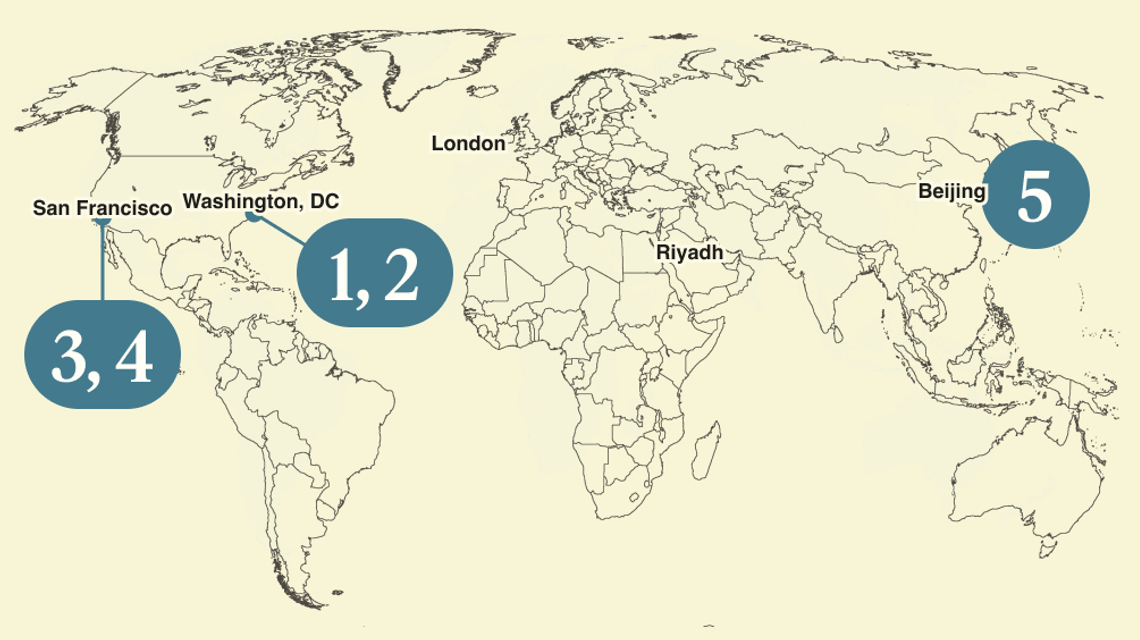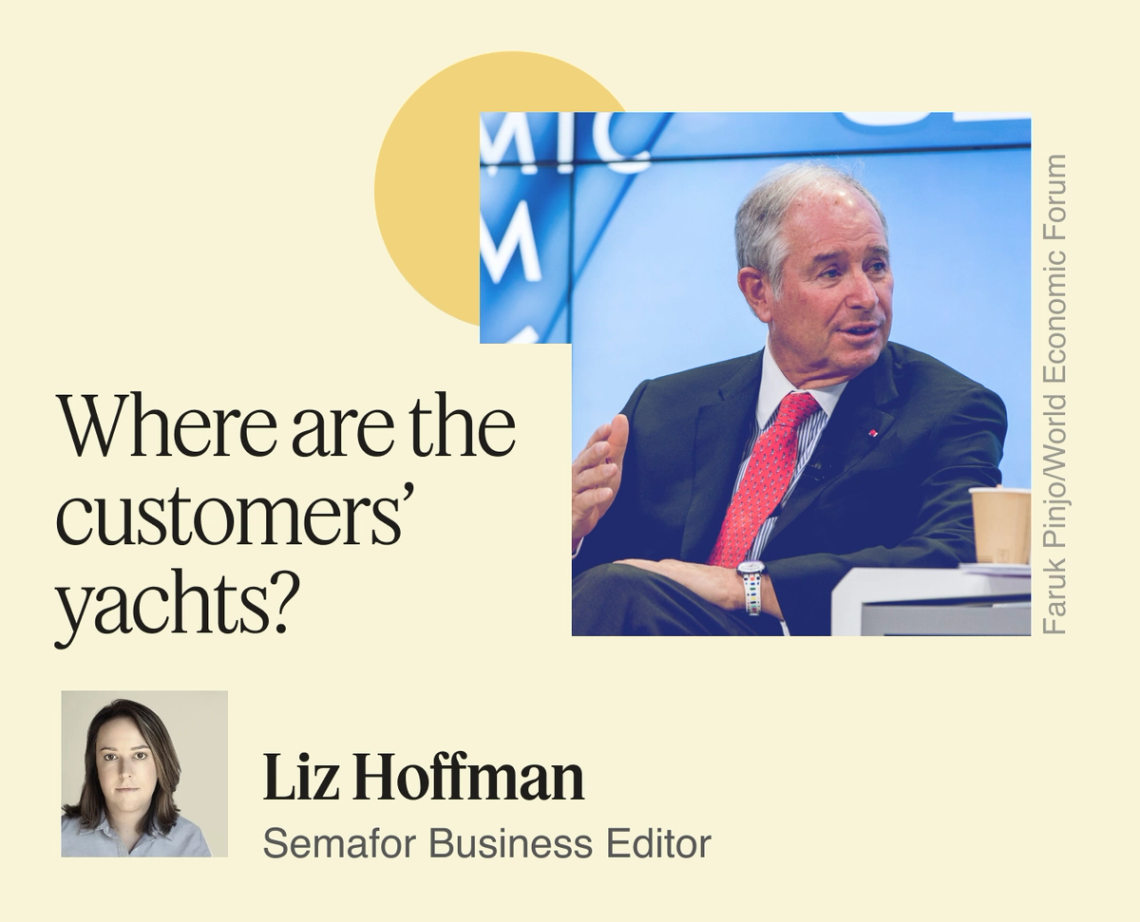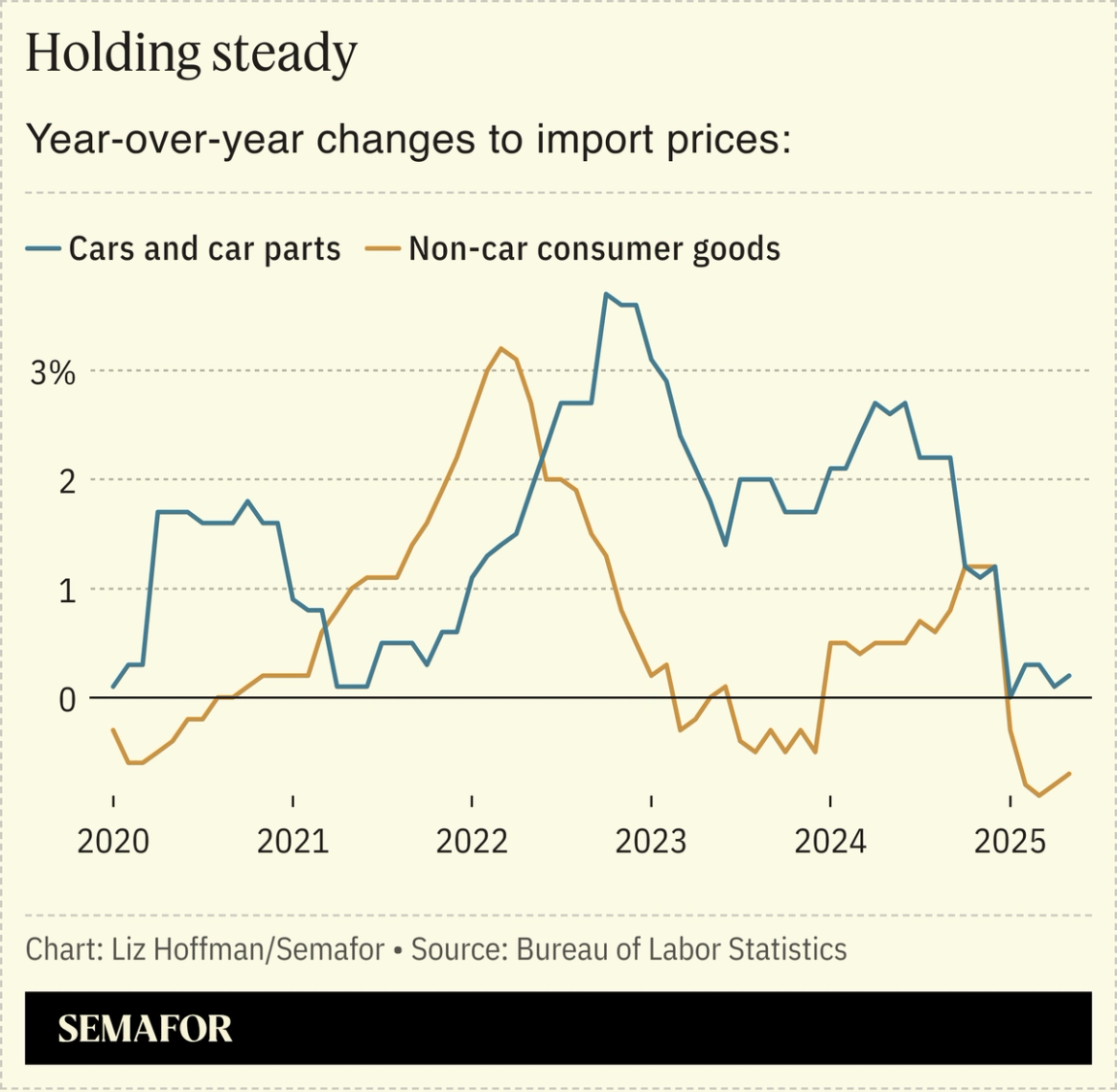| | In today’s edition, private equity’s widely unexpected transformation, and a merger perspective from͏ ͏ ͏ ͏ ͏ ͏ |
| |  | Business |  |
| |
|
 - Powell: Price pain coming
- Railroad M&A smoke signals
- Selling your forests
- AMD aims for Nvidia
- Honda joins the space race
 Potential Iran strike splits MAGA... Hong Kong IPO boom... PanAm is back with a $60,000 ticket |
|
 When Blackstone went public this week in 2007, Tom Wolfe, author of The Bonfire of the Vanities, was on hand at the New York Stock Exchange. He told CNBC the private equity firm’s move to the public markets might spell “the end of capitalism as we know it.” It didn’t. But looking back, it marked the end of private equity as we knew it. Going public changed Blackstone and the rivals that followed it — KKR in 2010, then Apollo, Carlyle, and Ares. They were not overnight successes as listed companies. Their stock prices languished as shareholders rightly assumed that they sat low on executives’ list of priorities, and behind fund investors and employees. But over the past decade, these firms reoriented themselves around their stock price — likely because their executives now own a lot of it. They dissolved lucrative but strange partnership structures that had kept their shares out of the S&P 500 index, and began emphasizing the steady fees they clip from managing money, rather than the lumpy profits they keep from managing it well. They invented a financial metric from whole cloth, “fee-related earnings,” and trained public stockholders to like it. Once they had, the incentives were to manage more and more money. Today they are asset-gathering machines whose value is increasingly in their size and scope, not their dealmaking smarts. Blackstone hit $1 trillion in client assets in 2023 and has its sights on $2 trillion. KKR is targeting $1 trillion by 2030, in what looks like a conservative bogey. Corporate buyouts are a shrinking slice of their businesses, dwarfed by fast-growing lending, insurance, real estate, and infrastructure arms. When you talk to industry executives these days, you don’t hear much about deals. They talk about products (evergreen funds!), distribution (retail!), and the virtues of financial superstores. “Where are the customers’ yachts?” asks the classic finance book, which notes that asset managers tend to make money for themselves whether or not they make money for their clients. The buyout buccaneers of the 1980s were their own clients, bootstrapping their corporate takeovers until their sky-high returns lured in outside money. That transformation is now complete. The barbarians at the gates are just asset managers now — big, and a bit boring. It wasn’t, as Wolfe predicted, the end of capitalism, but the end of a certain flavor of it. |
|
Powell: Tariff sting is coming |
The Federal Reserve unanimously voted to hold interest rates steady as Chair Jerome Powell warned that tariffs will increase prices, even if they haven’t yet. “Ultimately the cost of the tariff has to be paid, and some of it will fall on the end consumer,” he said Wednesday. “We know that’s coming.”  Inventory hoarding by companies ahead of the tariffs has likely delayed their effects at the checkout counter. The median Fed official still expects to cut interest rates twice this year, but “no one holds these rate paths with a lot of conviction,” Powell said. Meanwhile, the Bank of England, which has cut rates twice this year, also held steady Thursday. And Switzerland continues to go its own way. |
|
Rail mergers? Top regulator isn’t saying no. |
 James St. John/Flickr/CC BY 2.0 James St. John/Flickr/CC BY 2.0For weeks, railroad executives have played footsie in public, touting the benefits of mergers that would turn regional players into coast-to-coast juggernauts. Investors, too, have caught the bug, Semafor’s Rohan Goswami reports. But their enthusiasm hinges on one question: Will the industry’s regulator be on board? Try him. Patrick Fuchs, the 37-year-old chairman of the Surface Transportation Board, has signalled what has been interpreted as an openness to consolidation, or at least a clean break from the reflexive antipathy of his predecessor. It’s part of a broader focus on fact-driven, impartial judgments. That posture opens the door for an industry that has long wanted to consolidate — in part to compete with Canada’s transcontinental giants — but for much of the past two decades has been thwarted by Washington. |
|
Mike Lee’s fire-sale push |
 Elizabeth Frantz/Reuters Elizabeth Frantz/ReutersThe Trump administration’s push to monetize America’s natural resources got a controversial boost this week, when Sen. Mike Lee, a Utah Republican, proposed selling 3 million acres of federal land, sparking a MAGA backlash. Lee said the sale would fund housing development and “get Washington, DC, out of the way for communities that are just trying to grow.” The move sparked backlash from ideologically diverse corners, including conservationists, local politicians, and MAGA influencers.  @micsolana/X @micsolana/XTreasury Secretary Scott Bessent has been a leading proponent of selling off or otherwise putting hard-dollar values on national assets. Ideas include selling off spectrum, revaluing gold reserves, privatizing Amtrak, and auctioning off the government’s collection of art. Officials have hinted that proceeds might seed a US sovereign wealth fund. |
|
 Benoit Tessier/File Photo/Reuters Benoit Tessier/File Photo/ReutersNvidia, whose stranglehold on advanced AI chips has made it one of the world’s most valuable companies, has competition. AMD shares shot up this week as investors processed the unveiling of its latest chip, the MI400, last week. Some key endorsements helped: “When you first started telling me about the specs, I was like, ‘there’s no way.’ That just sounds totally crazy,” OpenAI’s Sam Altman said at the company’s live demo. Cohere’s CEO was also on hand to vouch for AMD’s progress, as we were representatives from xAI, Meta, and Microsoft, the biggest customers in this market. Take that support with a grain of salt, because every AI company lives in fear of GPU shortages and needs to keep its options open. Still, Semafor’s Reed Albergotti writes, it’s clear that this won’t be a winner-take-all market. Going forward, gains will come less from cramming more transistors onto each chip — Moore’s Law math — than from engineering and packaging advances: AMD employs more than 1,000 “rack engineers” whose job is to redesign server racks so massive that they are straining the concrete floors that support them and the energy grids that power them. |
|
 The explosion of the SpaceX rocket. TheRocketFuture/X via Reuters. The explosion of the SpaceX rocket. TheRocketFuture/X via Reuters.Honda unexpectedly entered the commercial space race, launching and landing its first reusable rocket. The 20-foot craft reached 900 feet in the air before landing precisely on its touchdown point in northern Japan. The Japanese car manufacturer has been involved in spaceflight-related equipment since 2021, including fuel cells and electrolysis systems for use in space, but kept its rocket plans “relatively quiet,” Gizmodo reported, making the launch a surprise. Japan wants to double the size of its space industry by the early 2030s. Honda is some way from challenging SpaceX’s dominance of the sector, although it may be heartened by the fact that the US company’s latest test of its giant Starship rocket ended in an explosion on the launchpad. |
|
 With so many financial newsletters competing for attention, it’s hard to find one that makes sense of the market. That’s why over 1 million savvy readers trust The Daily Upside for their daily dose of finance, economics, and investing insights. Created by Wall Street insiders, each issue delivers clear, actionable analysis — straight to your inbox. Subscribe for free today. |
|
➚ BUY: Los Angeles. Guggenheim CEO Mark Walter bought control of the Lakers at a $10 billion valuation. It’s the most expensive sports deal ever, though longtime owner Jerry Buss would have done better holding the S&P 500. ➘ SELL: Moscow. Vladimir Putin’s economic conference failed to attract any Western companies and only a smattering of mostly lower-level, allied politicians. |
|
“I can pay you for the pizza that we shared last night or make an investment or a trade. So that’s the future.”
— CEO Linda Yaccarino on X’s plans to build a superapp |
|
 Companies & Deals- Cold war: Microsoft is prepared to walk away from negotiations with OpenAI over the future of their collaboration as the AI startup looks to convert into a for-profit entity. “Critical issues” remain, the Financial Times reports, including the size of Microsoft’s future stake in OpenAI.
- Made anywhere but America: The Trump family’s new “all American” smartphone, which touts being “proudly designed and built in the United States,” will almost certainly include components from Asia.
- AI angst: “At least he said the quiet part out loud,” an Amazon employee wrote on the company’s Slack channels after CEO Andy Jassy said that AI would shrink the company’s corporate white-collar workforce over the next few years.
Watchdogs |
|
|